Going Ashore
Editor’s Note: This popped out from some place it had been hiding, and I will drop it into it’s appropriate place in the time line. It describes the time that the new and energetic Chief of Naval Operations, Bud Zumwalt, was on a tear to clean house on the list of Navy Admirals. There was some stuff going on here in town, as well.
– Vic
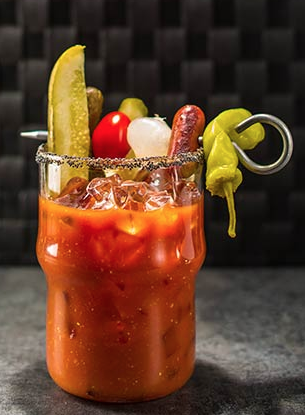
June, 2011. It was a delightful afternoon at the Amen Corner of the Willow Bar. The usual suspects were drifting in and Old Jim anchored the bar at his customary stool at the apex. Mac had driven his champagne-colored Jaguar sedan across the street from his apartment in The Madison, the assisted-living high rise across Fairfax Drive.
We could have talked about Midway, since it was the anniversary- the 69th- of the Battle that made Mac’s team of code-breakers into legends in the Intelligence Community. But we had pretty much beat his war time stories to death and I wanted to hear about what came after Mac’s active duty time. I had a stack of pristine cocktail napkins and a pen. A glass of Willow’s Happy Hour White was near my right hand, and a thirst for both stories and some life-giving alcohol.
Mac was in his usual aloha shirt topped with a sport jacket, looking quite dapper as usual. He was on the wagon again due to the drugs the oncologist had prescribed him for the prostate thing and his heart, and Willow tried to make up for it by making his Virgin Mary into a veritable cornucopia of jumbo olives, celery, cherry tomatoes and a pickle spear.
“That looks like a salad more than a glass of tomato juice,” I said.
“Mac smiled. “I won’t have to have dinner at The Madison tonight, that is for sure,” he said with a chuckle.
“It is time to hear about your life after the Navy, after Bud Zumwalt made you go ashore and retire. We agreed we are not going to talk about the details of your second career, right?”
“Mostly. We can talk about the Foreign Intelligence Surveillance Court and things like that, but there are some matters that are still a little sensitive after all these years.”
“Like Project JENNIFER?” I said, using the code-word people know about from the press and not the real name of the program.
Mac would not bite and shook his head. “Nope, not going to go there. But I can talk about Bronson Tweedy. He was old school, and the strong right arm to Director Helms.”
“Helms was Director for longer than most, wasn’t he?”
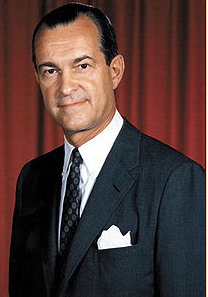
(CIA Director Richard Helms. Photo CIA).
“Yes. Mid-sixties right up to 1973. He was old school. He had been Naval Intelligence in New York City, working on the Eastern Sea Frontier plotting U-boats when a friend approached him to join the OSS’s Morale Operations Branch. They did the black propaganda. He was a Spook the rest of his life.”
“It is interesting that the Navy Reservists in New York were in the middle of everything, isn’t it?”
Mac smiled. “They were their own Navy, that is for sure. They ran the Lucky Luciano connection with the Mob to keep the docks safe from Axis saboteurs.”
“In real life a lot of them were prosecutors and cops and stuff, right?”
“It was all mixed up together, military, law enforcement and justice. It was actually sort of a parallel universe.”
“In addition to the usual counter-intelligence work, they ran the scientific exploitation of the former Nazi scientists out on Long Island after the war.”
“Yes, the projects that came out of the Castle were of extraordinary value to CNO Arleigh Burke, who was creating the Nuclear Navy.”
“But you went to work at F Street at the IC Staff?”
“Not at first, and that wasn’t the name. I think we were in the Original Headquarters Building at Langley. Long before there was a new one.”
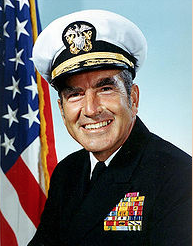
(CNO Admiral Elmo “Bud” Zumwalt. Phtoto USN).
He took a sip of his Virgin Mary and seemed to be concentrating on something far away. “I was still on active duty in the fall of 1969. Bud Zumwalt was on a tear to get every admiral who had been senior to him to retire.”
“I have heard about Zumwalt and his Z-grams and whiz kids. He really shook things up in the Navy after he was put in charge.”
“I didn’t want to go ashore, but the CNO wanted my number to promote my friend Rex to flag rank and that is just the way it was. There was no animosity between us; Rex was Zumwalt’s guy from his days at NAVFORV (Naval Forces Vietnam), and that is who he wanted to be the Director of Naval Intelligence (DNI).”
“It was in October 1969 that I was approached by Bronson Tweedy, who was Helm’s Deputy and a career Spook very much like him. He was born in London to American parents; he went to school there in the 1930s , and lived with a family in Germany to get acquainted with their customs, language and culture. He arrived to start his visit the day Adolf Hitler became chancellor. He was a Princeton guy with a degree in European history, and went into the advertising game at Benton and Bowles on Madison Avenue before the war. In 1942, he volunteered for Naval Intelligence and served in North Africa and Europe interrogating captured German U-boat crews.”
“Naval Intelligence again,” I said in wonder. “Was he part of that secret POW camp the Army ran down at Fort Hunt?”
Mac nodded. “I am not sure, but it would have been Bronson down to the ground. That was the interrogation program code-named ‘P.O. Box 1142’ used against prisoners who were deemed ‘high value,’ like U-boat commanders.”
“I have walked around the grounds where the camp was located. You would not have known anything happened there, since they tore everything down right after the war except the old Coastal Artillery batteries. It is an interesting story, and it was also probably a violation of the Geneva Convention. You know, there are still things that people don’t want to talk about that went on at the intersection of operations and maritime intelligence.”
“I agree. I touched a live wire one time from the early 1950s,” I said. “I was working on a story about a counterfeit ring in France in the 1950s a while back with Tom “Big Smoke” Duvall and touched a live wire. Tom told me to back off and tell the story the way he wanted it or drop it. It might have had something to do with the intelligence connection to Lucky Luciano and the Mob, but I don’t know for sure and I was smart enough not to ask.”
Mac nodded. “After the war, Bronson briefly returned to advertising before being recruited by the CIA. He served in Switzerland, and DC just as the Agency was being formed, and he was Chief of Station in Vienna and twice in London. Then he founded the Africa Division, which was a result of Eisenhower’s dislike for Patrice Lumumba.”
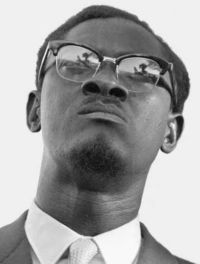
(Congolese leader Patrice Lamumba. Photo AP).
“Did he have anything to do with the coup and Lumumba’s death? I remember the revelations about the rubber gloves and lethal toothpaste they were going to slip into the Congolese President’s bathroom. It was as cool an idea as the poisoned cigars they were going to try to get Castro to smoke.”
“I assume that is the case, but I didn’t have anything to do with it personally. And the toothpaste ploy makes sense. Lumumba did have a brilliant smile, from what I recall. He died right before John Kennedy was inaugurated, and Bronson was in Leopoldville around that time, but we never talked about the list of shady things that later came to be known as being part of the Agency’s Crown Jewels. After that, he was tapped to head the Eastern European Division. When Dick Helms was confirmed as Director in 1966, Bronson moved up to be Deputy.”
“There was something going on in those years,” I said. “I mean, someone got away with killing the President of the United States. The Warren Commission had so many glaring flaws that everyone suspected it was not the open and shut lone gunman that the Report claimed it was.”
“We have talked about that before,” he said, looking around to see if anyone seemed particularly interested in the topic. “I think there was a Texas connection. When Nixon came into office in 1968, his people immediately focused on the Intelligence Community. Henry Kissinger thought he had all the answers and viewed the Agency with condescension.”
“He still does, from what I hear.”
“He thought the boys from Langley were not sharing all that they knew with the Administration. Nixon felt that steadily increasing capabilities and costs directed toward IC functions should be yielding better analysis. Plus, the coup in Cambodia in ’70 caught everyone by surprise, and Nixon hated being surprised. “
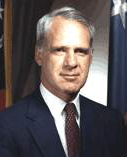
(James Schlesinger as SECDEF, 1970. Photo DoD).
“Since there did not appear to be a direct link between level of effort, and the money spent to produce it, Nixon commissioned James Schlesinger to conduct a survey of the IC. His chartered goal was to identify problems within the IC and recommend ideas for improvement.”
“I have been to that movie before. I think they are doing it again now,” I laughed.
“So all that is swirling around while I figure out what to do as I am being I am being pushed out of the Navy. Bronson must have heard about it on the grapevine. He gave me a call in October of 1969, and asked me to come down to the City Tavern Club on M Street and talk about a proposition he had for me.”
Prep work for the dinner trade complete, Willow Co-owner Tracy O’Grady came out to press the flesh with the usual suspects before the kitchen got busy with the dinner trade. She worked the Amen Corner there by the front window for a while as Old Jim showed her his latest flight of blank verse from the notebook he kept in his corduroy jacket. Jim is still quite the poet. My pen was still poised. “Ok, Sir, you retired in 1971?”
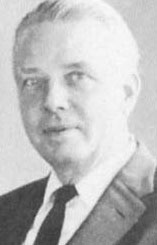
(CIA Deputy Broson Tweedy).
“Yes. Novermber of 1971. Bronson Tweedy called me and asked if I could meet him for lunch at the City Tavern Club on M Street in Georgetown, which I agreed to do. He liked that place- very traditional Washington institution. At lunch he said, “In view of the Schlesinger study making these demands on what the newly established Director of Central Intelligence is supposed to do, the DCI has decided reluctantly that he will have to expand his budget staff to carry out more coordination of the intelligence community. And among other things we’d like you to come and and work for us.”
“I asked him at that point if he wanted me to come in uniform or if he wanted me to come as a civilian. He said, “We want you as a civilian.””
“When was that, Admiral?”
“This was probably the first week of November. Bronson said: “We’d like to have you on board by the first of December.” I told him that I doubted that I could get “unhooked” from the Navy that quickly, but I would try. After a pleasant lunch, I returned to the Pentagon and made inquiries, and the first thing I was confronted with was that General Bennett, the Director of DIA, was away on a trip. I was told that there was no way that I could send my request for retirement without his endorsement and agreement, which was obvious. So, it being readily apparent that I couldn’t carry get on the retired list by the first of December, the earliest I would be able to do it would be the first of January the following year. That was agreed to, and that’s what happened. As soon as General Bennett returned from his trip, I had my letter on his desk requesting retirement. He endorsed it, I went through the necessary procedures, and I was retired as of the 31st of December 1971 and went on the retired list on the 1st of January 1972.”
“I was still worried about the Draft then,” I said with a sigh. “I was dodging the draft and hoping I wouldn’t get nailed as soon as I graduated. Did you have any regrets about going to the CIA after all those years in Naval Intelligence?”
“No. It was a good offer. I don’t remember the pay scale at the time, but Bronson Tweedy’s offer to me was that, “We will take you on as a contract employee. We’ll give you a one-year contract renewable. And we will pay you the equivalent of a GS-16 salary.”
“That would be a General Schedule employee equivalent to a Rear Admiral, right?”
“Yes. The concept of the Senior Executive Service did not exist then. Compensation was about the same as what I was making from the Navy. I knew that I would have to forego part of my retired pay. I think the formula at the time was that I’d have to lose half of my retired Navy pay while I was in government employ and have that restored to the full annuity upon leaving government service. But I would concurrently be getting a full civil service salary or salary from the DCI, which would really give me a pay-and-a-half and make me a real true “double dipper,” a status for which I was accused of many times.”
“It always seems to irritate some people around here when somebody in the military finally gets a decent salary. With full military retirement and a job, you can actually afford to live in DC. At least you did not have to go into bid-and-proposal work with the rest of us Beltway Bandits.”
“I am thankful for that,” he said, taking a nibble of the celery stalk in his Virgin Mary. “New Year’s Day of that year fell on a Sunday, so we had Monday off to observe the holiday. I believe I retired on a Friday, and went to work at CIA headquarters on Tuesday. I know I had a three-day break between careers Time enough to have a New Year’s party and recover from it.”
“That only means you were not trying hard enough,” I said with a snort. “You told me about the party the senior officers had at Joe Rochefort’s house during the War after the word came back that Station HYPO had been right, and the Japanese were shattered at the Battle of Midway.”
Mac nodded solemnly. “We did not see some of them for a few days. But this was no war and we were all a little older. When I arrived at the DCI headquarters, I first went into a group that was headed by J.J. Hitchcock, who was one of my previous friends in naval service.”
“More Navy” I said, underlining my notes.
“Yes. I had first met J.J. at the Naval Security Station back in ’47-48 when he was doing some research work on indications and warning. J.J. had become the I&W expert for the DCI over the years. He was instrumental in setting up the Watch Committee and doing the Weekly Review of worldwide Indicators and he issued the weekly Watch Report that was a major instrument of power in the government during those years. By then, though, J.J. wasn’t doing that kind of work any longer. He was simply doing staff work.”
“Did you work on the 6th Floor at Langley? That is where we had our offices on the Community Management Staff after they changed the name again.”
Mac looked contemplative. “Could have been. That seems right.”
“That is the subject of the first major review of the way the Intelligence Community worked. There was some thought that once the war in Vietnam was transferred back to the Republic of Vietnam, there would be plenty of budget authority to transfer to other more strategic tasking.”
“I have heard about the Williamsburg Conference when the big post-Vietnam drawdown was going on. The military divided up all the responsibilities for the DoD components of the IC.”
”That came later,” said Mac. “Once we had pretty much extricated our forces in the field in 1973. The Schlesinger report landed on our desks for implementation, with some lofty observations. It claimed the line between ‘military’ and ‘non-military”’ intelligence had faded; scientific and technical intelligence with both civilian and military applications had become the main battery for the community. All the other stuff was sorted according to the people that used it. The strategic stuff was for the national decision makers, and the tactical stuff they didn’t care about was for the regional and functional Joint Commanders.”
“Like CINCPAC and the strategic Air Command?”
“Precisely. The President and the National Security Council with Kissinger were served mostly by CIA for the national-level stuff, though NSA was the critical collector for special SIGINT. But there was more, and it was urgent. The rate at which the Soviets were cranking out innovative technology revolutionized the intelligence cycle.”
“We called it Tasking, Production, Exploitation and Dissemination,” I said. “TPED for short. I don’t know what they call it now. Find, Fix, Finish, Exploit, Analyze, and Disseminate?”
“I can’t keep up with it,” said Mac with a lopsided smile. “That is the same concept we used starting with Operation intelligence in the Pacific War. Nothing changes except the acronyms.”
“So that is the 1970s under Richard Nixon at Langley.”
“Yep. Before we moved downtown and the two Congressional Panels blew the bottom out of everything. That is worth a conversation all on its own.”
I underlined a couple of Mac’s quotes on the square white cocktail napkin in front of me, and added the Congressional Pike and Church Commissions to my notes. “I will do my research, Sir, and be prepared to discuss them when you feel up to it.”
“I am always ready,” said Mac. “Those were some interesting times.”
I smiled and waved at Big Jim the bartender for the check. “Isn’t that a Chinese curse, Admiral?”
“Only if you are uninterested,” he said with a grin.
Copyright 2017 Vic Socotra
www.vicsocotra.com
